2015年高中英语阅读理解 第三部分 名人故事(三)练习
高三英语阅读理解(人物故事)及其解题技巧及练习题(含答案)含解析

高三英语阅读理解(人物故事)及其解题技巧及练习题(含答案)含解析一、高中英语阅读理解人物故事类1.阅读理解When I was 12 years old, I already knew that my teen years were going to be the worst years of my life. I was a total outsider, bullied (欺凌) at school. I felt completely alone in my small town.But by starting to do volunteer work when I was 14, I turned my problem into a passion for helping others. The opportunity to practice kindness made me feel like my life had a greater purpose. The more positive energy I shared, the more kindness and appreciation I received. I realized that my purpose in life would be to reach out to people, specifically teenagers, and help them feel less alone.Books were my true friends back then. I was so thankful that the authors wrote those books. The kindness they offered me with their books saved my life. One of my biggest dreams was to become an author so I could write books that would help other teenagers the way those books helped me.After surviving terrible experiences at school and at home, I made a choice to take the optimistic, positive road in the next steps of my journey. My dream career, one I thought was only possible for the authors I loved, is what I am doing now. I have been a full-time author of teen novels since 2007 and am grateful for this amazing opportunity to reach out to readers every single day.Kindness saved me when I needed help the most. Even small acts of kindness can change someone's life. You never know what someone else is going through. But by practicing daily kindness, you become an architect of positive change.(1)What was the author's life like when he was 12?A.Boring.B.Peaceful.C.Unhappy.D.Meaningful.(2)How did the volunteer work benefit the author?A.It made him popular in his town.B.It helped him find the meaning of life.C.It helped him understand others' lives better.D.It helped to shape his dream career.(3)Why did the author choose writing as his job?A.He was inspired by his teacher.B.He could pass positive energy to readers.C.He wanted to share his school experiences.D.He found he had a talent for writing.(4)What does the author suggest readers do in the last paragraph?A.Say 'no' to bullies bravely.B.Make positive changes in their lives.C.Treat others with kindness in daily life.D.Learn to care more about others' feelings.【答案】(1)C(2)B(3)B(4)C【解析】【分析】本文是一篇记叙文,作者讲述了自己参加志愿活动的经历,告诉人们:一次小善举也可能改变一个人的一生。
英语阅读理解(人物故事)练习题20篇及解析
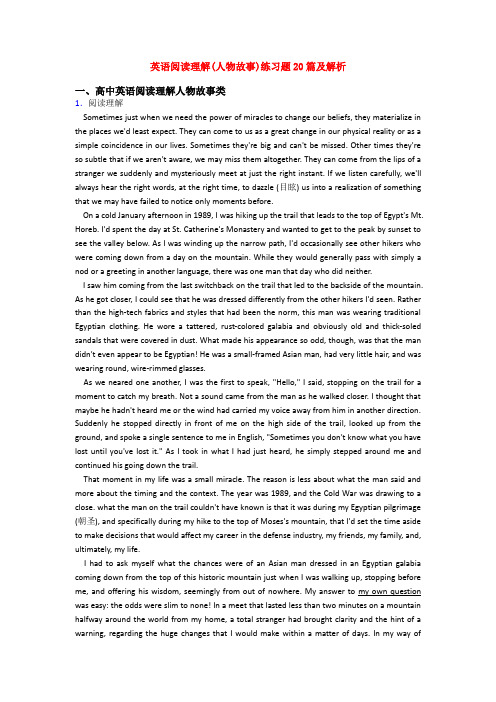
英语阅读理解(人物故事)练习题20篇及解析一、高中英语阅读理解人物故事类1.阅读理解Sometimes just when we need the power of miracles to change our beliefs, they materialize in the places we'd least expect. They can come to us as a great change in our physical reality or as a simple coincidence in our lives. Sometimes they're big and can't be missed. Other times they're so subtle that if we aren't aware, we may miss them altogether. They can come from the lips of a stranger we suddenly and mysteriously meet at just the right instant. If we listen carefully, we'll always hear the right words, at the right time, to dazzle (目眩) us into a realization of something that we may have failed to notice only moments before.On a cold January afternoon in 1989, I was hiking up the trail that leads to the top of Egypt's Mt. Horeb. I'd spent the day at St. Catherine's Monastery and wanted to get to the peak by sunset to see the valley below. As I was winding up the narrow path, I'd occasionally see other hikers who were coming down from a day on the mountain. While they would generally pass with simply a nod or a greeting in another language, there was one man that day who did neither.I saw him coming from the last switchback on the trail that led to the backside of the mountain. As he got closer, I could see that he was dressed differently from the other hikers I'd seen. Rather than the high-tech fabrics and styles that had been the norm, this man was wearing traditional Egyptian clothing. He wore a tattered, rust-colored galabia and obviously old and thick-soled sandals that were covered in dust. What made his appearance so odd, though, was that the man didn't even appear to be Egyptian! He was a small-framed Asian man, had very little hair, and was wearing round, wire-rimmed glasses.As we neared one another, I was the first to speak, "Hello," I said, stopping on the trail for a moment to catch my breath. Not a sound came from the man as he walked closer. I thought that maybe he hadn't heard me or the wind had carried my voice away from him in another direction. Suddenly he stopped directly in front of me on the high side of the trail, looked up from the ground, and spoke a single sentence to me in English, "Sometimes you don't know what you have lost until you've lost it." As I took in what I had just heard, he simply stepped around me and continued his going down the trail.That moment in my life was a small miracle. The reason is less about what the man said and more about the timing and the context. The year was 1989, and the Cold War was drawing to a close. what the man on the trail couldn't have known is that it was during my Egyptian pilgrimage (朝圣), and specifically during my hike to the top of Moses's mountain, that I'd set the time aside to make decisions that would affect my career in the defense industry, my friends, my family, and, ultimately, my life.I had to ask myself what the chances were of an Asian man dressed in an Egyptian galabia coming down from the top of this historic mountain just when I was walking up, stopping before me, and offering his wisdom, seemingly from out of nowhere. My answer to my own question was easy: the odds were slim to none! In a meet that lasted less than two minutes on a mountain halfway around the world from my home, a total stranger had brought clarity and the hint of a warning, regarding the huge changes that I would make within a matter of days. In my way ofthinking, that's a miracle.I suspect that we all experience small miracles in our lives every day. Sometimes we have the wisdom and the courage to recognize them for what they are In the moments when we don't,that's okay as well. It seems that our miracles have a way of coming back to us again and again.And each time they do, they become a little less subtle, until we can't possibly miss the messagethat they bring to our lives!The key is that they're everywhere and occur every day for different reasons, in response to the different needs that we may have in the moment. Our job may be less about questioning the extraordinary things that happen in our daily lives and more about accepting the gifts they bring.(1)Why did the author make a pilgrimage to Mt Horeb in Egypt?A. He was in search of a miracle in his life.B. It was a holy place for a religious person to head for.C. He intended to make arrangements for his life in the future.D. He waited patiently in expectation of meeting a wise person.(2)What does the underlined part "my own question" refer to in paragraph 6?A. For what reason did the man stop before me?B. Why did the Asian man go to the mountain?C. What change would I make within a matter of days?D. What was the probability that others told us the right words?(3)Which of the following is closest in meaning to the underlined word "subtle" in paragraph 7?A. Apparent.B. Delicate.C. Precise.D. Sufficient.(4)The author viewed the meet with the Asian man as a miracle in his life in that ________.A. the Asian man's appearance had a deciding effect on his future lifeB. his words were in perfect response to the need he had at that momentC. what the Asian man said was abundant in the philosophy of lifeD. the Asian man impressed on him the worth of what he had possessed(5)What might be the best title for the passage?A. Can you recognize a miracle?B. Is a miracle significant to us?C. When might a miracle occur?D. Why do we need a miracle?(6)After the encounter of the Asian man, what will the writer probably do immediately?A. Continue walking up to the top of the mountain.B. Have a rest to refresh himself.C. Try to have a heart-to-heart conversation with the Asian man.D. Come down the mountain.【答案】(1)C(2)D(3)B(4)B(5)A(6)D【解析】【分析】本文是一篇记叙文,作者讲述了一次埃及朝圣时,爬到何烈山半山腰时,偶遇了一位正在下山的亚洲陌生人。
(英语)高三英语阅读理解(人物故事)专题训练答案及解析

(英语)高三英语阅读理解(人物故事)专题训练答案及解析一、高中英语阅读理解人物故事类1.阅读理解Five thousand square meters of old damaged cars, motorcycles and boats fill this junkyard. For a casual onlooker, this might be a very sad sight. But for Andy, it's a real treasure. "I've been a junk hoarder (囤积者) for my whole life and I like fixing up what shouldn't be thrown away. Around 200 old cars end up in this junkyard every week. Some of them are sold for parts, others get repaired, and still others are beyond repair."His father Bobby started the business some 50 years ago and still spends every morning there. The father and son have very different approaches to their work. They got a Dean cab that was getting thrown away and that was the father's project, which Andy did not want him to do. "He did basically the opposite of everything I told him and I think he did it just to make me mad. He dumped a ton of money into this car, but in the end it wouldn't run." Andy said jokingly.The unusual family business attracted the attention of a TV crew. That's how the show Janka Empire came to be featured on a network of the Discovery Channel. This show, five years of shooting, five seasons and 60 episodes (集), is popular. "There are hundreds of junkyards throughout the United States. I think what's interesting is that it is a family business. My father and I started the business and we joke very well back and forth and I think that's what people like. The cars that end up at the junkyard come out with endless surprises. See, this was a junk car and we restored it with a blown motor. Yet I don't get a chance to ride around it too often. Because despite its shining appearance, the noise of the engine is truly deafening and I worry my neighbors will not put up with it."(1)What does Andy seem to like about his junkyard?A. It is very large.B. It may be a bad sight.C. It is amazing and valuable.D. It is his life dreamland.(2)What can we infer from the "one Dean cab" case?A. The father is ready to follow his son's advice.B. The son is impatient and fed up with his father.C. The father and son get on well with each other.D. The father and son often disagree with each other.(3)Why is the show Janka Empire popular?A. There are hundreds of junkyards in the United States.B. Bobby and Andy run their family business in an unusual way.C. The show is a series of 5 seasons and 60 episodes.D. Bobby and Andy can make the junk car attractive.(4)Which of the following words can best describe Bobby and Andy?A. Devoted and creative.B. Funny and ridiculous.C. Gentle and respectable.D. Economical and wealthy.【答案】(1)C(2)D(3)B(4)A【解析】【分析】本文是一篇记叙文,父亲和儿子有非常不同的工作方法。
(英语)高三英语阅读理解(人物故事)的技巧及练习题及练习题(含答案)
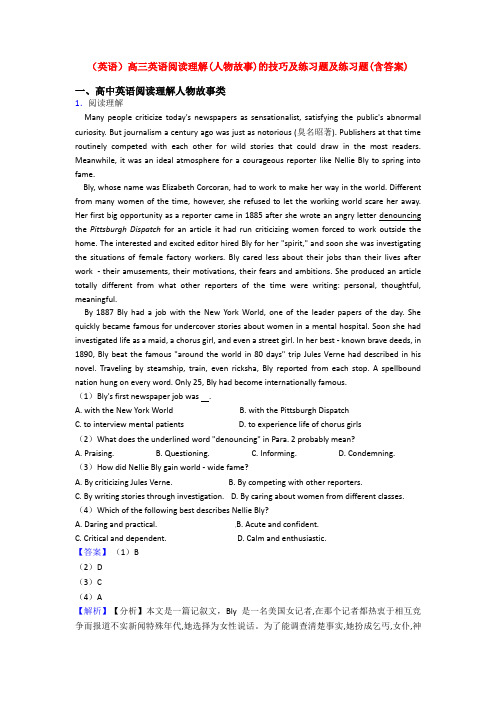
(英语)高三英语阅读理解(人物故事)的技巧及练习题及练习题(含答案)一、高中英语阅读理解人物故事类1.阅读理解Many people criticize today's newspapers as sensationalist, satisfying the public's abnormal curiosity. But journalism a century ago was just as notorious (臭名昭著). Publishers at that time routinely competed with each other for wild stories that could draw in the most readers. Meanwhile, it was an ideal atmosphere for a courageous reporter like Nellie Bly to spring into fame.Bly, whose name was Elizabeth Corcoran, had to work to make her way in the world. Different from many women of the time, however, she refused to let the working world scare her away. Her first big opportunity as a reporter came in 1885 after she wrote an angry letter denouncing the Pittsburgh Dispatch for an article it had run criticizing women forced to work outside the home. The interested and excited editor hired Bly for her "spirit," and soon she was investigating the situations of female factory workers. Bly cared less about their jobs than their lives after work - their amusements, their motivations, their fears and ambitions. She produced an article totally different from what other reporters of the time were writing: personal, thoughtful, meaningful.By 1887 Bly had a job with the New York World, one of the leader papers of the day. She quickly became famous for undercover stories about women in a mental hospital. Soon she had investigated life as a maid, a chorus girl, and even a street girl. In her best - known brave deeds, in 1890, Bly beat the famous "around the world in 80 days" trip Jules Verne had described in his novel. Traveling by steamship, train, even ricksha, Bly reported from each stop. A spellbound nation hung on every word. Only 25, Bly had become internationally famous.(1)Bly's first newspaper job was .A. with the New York WorldB. with the Pittsburgh DispatchC. to interview mental patientsD. to experience life of chorus girls(2)What does the underlined word "denouncing" in Para. 2 probably mean?A. Praising.B. Questioning.C. Informing.D. Condemning.(3)How did Nellie Bly gain world - wide fame?A. By criticizing Jules Verne.B. By competing with other reporters.C. By writing stories through investigation.D. By caring about women from different classes.(4)Which of the following best describes Nellie Bly?A. Daring and practical.B. Acute and confident.C. Critical and dependent.D. Calm and enthusiastic.【答案】(1)B(2)D(3)C(4)A【解析】【分析】本文是一篇记叙文,Bly是一名美国女记者,在那个记者都热衷于相互竞争而报道不实新闻特殊年代,她选择为女性说话。
(英语)高三英语阅读理解(人物故事)及其解题技巧及练习题(含答案)

(英语)高三英语阅读理解(人物故事)及其解题技巧及练习题(含答案)一、高中英语阅读理解人物故事类1.阅读理解On a recent trip to the island of Newfoundland, Canada, my husband asked our talkative cab driver what made him most proud to be from there."Our generosity and hospitality (好客)," he replied in a strong local accent. "Your car breaks down in the middle of nowhere, someone will stop to help. People here are kind like that."His answer lingered in my mind during that ride with my husband and teenage kids, as we headed out to explore on the first day of our vacation.Little did I know we were about to experience some of that remarkable Newfoundland kindness for ourselves.We met Alma that same morning at the start of a long hike.Our teenagers hurried ahead, and as we walked behind, admiring the scenery, two women in sunglasses and summer hiking gear stopped.They'd heard us discussing different routes, then asked if we'd like suggestions.They looked to be in their 40s, and were both enthusiastic to share their local expertise.We listened eagerly, taking mental notes, until one of the women asked, "You have a car, right?"I explained that there were no cars available during our week on the island, so we had to rely on cabs instead."Oh no," she said, "you need a car." And then, as casually as if offering a piece of chewing gum (口香糖), she said: "Take mine!"Dumbfounded, my husband and I just smiled in disbelief."Why not?" She insisted. "You need a car to get to know all these places.""But you don't even know us," I said."That doesn't matter," she continued with absolute determination.Stunned, I looked over at her friend, who shrugged and said, "That's Alma."Forty minutes of talking later, my family climbed into Alma's car.We spent the rest of our vacation discovering different areas of this beautiful island.But it wasn't the groups of whales we saw, or the vast areas of woodland, that made this place so memorable.Instead, it was the act of kindness from a complete stranger that made us realize how special Newfoundland really was.Next year, there's no doubt where we'll be taking our summer vacation. Who knows what act of kindness we'll meet then?(1)What problem did the author's family have in Newfoundland?A.They couldn't understand the local accent.B.Their car broke down on the first day.C.They got lost during a hike.D.They didn't have a car.(2)The underlined word "dumbfounded" in Paragraph 12 is closest in meaning to ______.A.shockedB.satisfiedC.relievedD.embarrassed(3)What impressed the author most during her stay in Newfoundland?A.The talkative cab driver.B.The whales swimming.C.The beautiful scenery of the island.D.The help from an enthusiastic stranger.(4)What can we infer about the author from the last paragraph?A.She is looking forward to meeting Alma once more.B.She expects to visit Newfoundland again.C.She hasn't decided where to go next year.D.She also wants to be kind to others during vacation.【答案】(1)D(2)A(3)D(4)B【解析】【分析】本文是一篇记叙文,作者最近一次去加拿大的纽芬兰旅行时,被当地人的热情好客深深触动。
高三英语阅读理解(人物故事)专题训练答案及解析
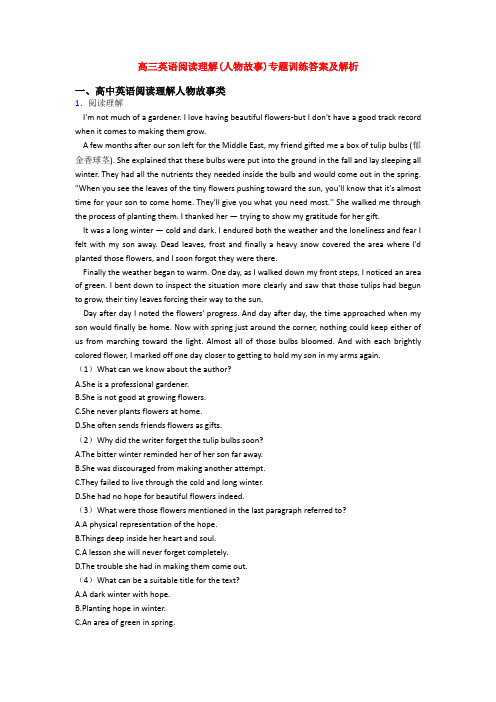
高三英语阅读理解(人物故事)专题训练答案及解析一、高中英语阅读理解人物故事类1.阅读理解I'm not much of a gardener. I love having beautiful flowers-but I don't have a good track record when it comes to making them grow.A few months after our son left for the Middle East, my friend gifted me a box of tulip bulbs (郁金香球茎). She explained that these bulbs were put into the ground in the fall and lay sleeping all winter. They had all the nutrients they needed inside the bulb and would come out in the spring. ''When you see the leaves of the tiny flowers pushing toward the sun, you'll know that it's almost time for your son to come home. They'll give you what you need most.'' She walked me through the process of planting them. I thanked her — trying to show my gratitude for her gift.It was a long winter — cold and dark. I endured both the weather and the loneliness and fear I felt with my son away. Dead leaves, frost and finally a heavy snow covered the area where I'd planted those flowers, and I soon forgot they were there.Finally the weather began to warm. One day, as I walked down my front steps, I noticed an area of green. I bent down to inspect the situation more clearly and saw that those tulips had begun to grow, their tiny leaves forcing their way to the sun.Day after day I noted the flowers' progress. And day after day, the time approached when my son would finally be home. Now with spring just around the corner, nothing could keep either of us from marching toward the light. Almost all of those bulbs bloomed. And with each brightly colored flower, I marked off one day closer to getting to hold my son in my arms again.(1)What can we know about the author?A.She is a professional gardener.B.She is not good at growing flowers.C.She never plants flowers at home.D.She often sends friends flowers as gifts.(2)Why did the writer forget the tulip bulbs soon?A.The bitter winter reminded her of her son far away.B.She was discouraged from making another attempt.C.They failed to live through the cold and long winter.D.She had no hope for beautiful flowers indeed.(3)What were those flowers mentioned in the last paragraph referred to?A.A physical representation of the hope.B.Things deep inside her heart and soul.C.A lesson she will never forget completely.D.The trouble she had in making them come out.(4)What can be a suitable title for the text?A.A dark winter with hope.B.Planting hope in winter.C.An area of green in spring.D.Living a changeable life.【答案】(1)B(2)D(3)A(4)B【解析】【分析】本文是一篇记叙文,作者的儿子去了中东,作者感到孤独和寂寞。
2015年高考英语真题_人物传记、故事类
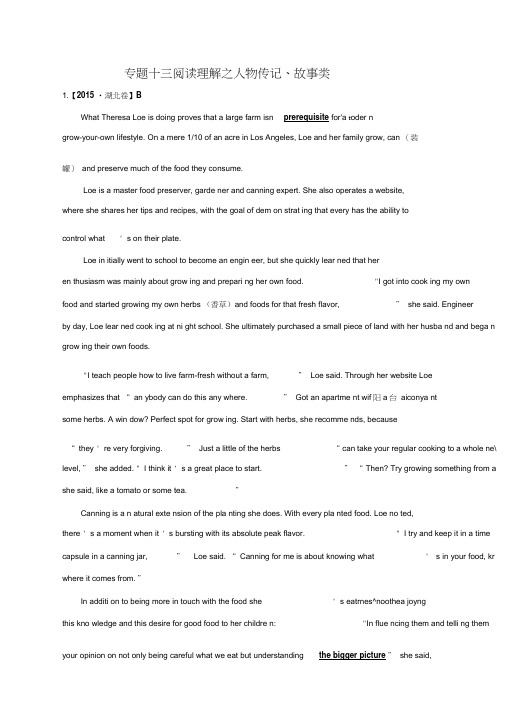
专题十三阅读理解之人物传记、故事类1.【2015 •湖北卷】BWhat Theresa Loe is doing proves that a large farm isn prerequisite for'a t oder ngrow-your-own lifestyle. On a mere 1/10 of an acre in Los Angeles, Loe and her family grow, can (装罐)and preserve much of the food they consume.Loe is a master food preserver, garde ner and canning expert. She also operates a website,where she shares her tips and recipes, with the goal of dem on strat ing that every has the ability tocontrol what ' s on their plate.Loe in itially went to school to become an engin eer, but she quickly lear ned that heren thusiasm was mainly about grow ing and prepari ng her own food. "I got into cook ing my ownfood and started growing my own herbs (香草)and foods for that fresh flavor, ” she said. Engineerby day, Loe lear ned cook ing at ni ght school. She ultimately purchased a small piece of land with her husba nd and bega n grow ing their own foods."I teach people how to live farm-fresh without a farm, ” Loe said. Through her website Loeemphasizes that “ an ybody can do this any where. ” Got an apartme nt wif阳a台aiconya ntsome herbs. A win dow? Perfect spot for grow ing. Start with herbs, she recomme nds, because“ they ' re very forgiving. ” Just a little of the herbs “ can take your regular cooking to a whole ne\ level, ” she added. " I think it ' s a great place to start. ” “ Then? Try growing something from a she said, like a tomato or some tea. ”Canning is a n atural exte nsion of the pla nting she does. With every pla nted food. Loe no ted,there ' s a moment when it ' s bursting with its absolute peak flavor. " I try and keep it in a time capsule in a canning jar, ”Loe said. “ Canning for me is about knowing what ' s in your food, kr where it comes from. ”In additi on to being more in touch with the food she ' s eatrnes^noothea joyngthis kno wledge and this desire for good food to her childre n: "In flue ncing them and telli ng them your opinion on not only being careful what we eat but understanding the bigger picture ” she said,"that if we don ' t take care of theneawthl..” 55. The underlined word ________________________________ " prerequisite ” (Pare. 1) isclosest in meaning to " ” .56. Why does Loe suggest start ing with herbs?A. They are used daily.B. They are easy to grow.C. They can grow very tallD. They can be eate n un cooked57. Accord ing to Loe, what is the ben efit of canning her pla nted foods?A. It can preserve their best flavorB. It can promote her on li ne salesC. It can better her cook ing skillsD. It can improve their nu triti on58. What is the “ the bigger picture ” (Para. 6) that Loe wishes her children to understand?A. The kno wledge about good foodB. The way to live a grow-our-ow n lifeC. The joy of gett ing in touch with foodsD. The resp on sibility to protect our earth【解折】试題分析:本文是一篇记叙文。
高中英语阅读理解(人物故事)的技巧及练习题及练习题(含答案)含解析
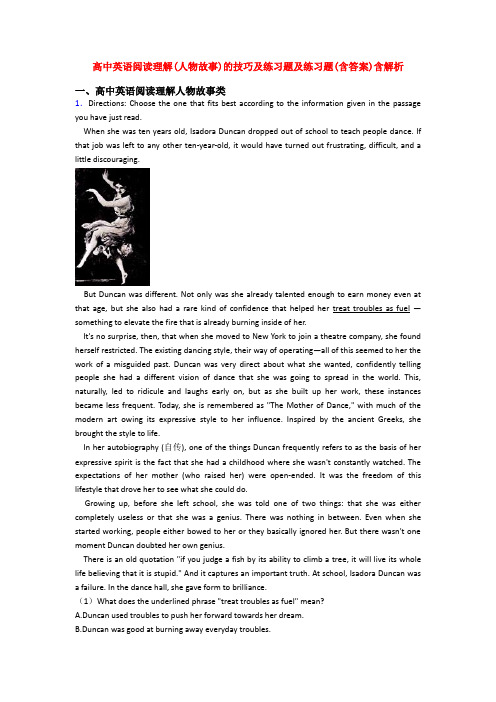
高中英语阅读理解(人物故事)的技巧及练习题及练习题(含答案)含解析一、高中英语阅读理解人物故事类1.Directions: Choose the one that fits best according to the information given in the passage you have just read.When she was ten years old, Isadora Duncan dropped out of school to teach people dance. If that job was left to any other ten-year-old, it would have turned out frustrating, difficult, and a little discouraging.But Duncan was different. Not only was she already talented enough to earn money even at that age, but she also had a rare kind of confidence that helped her treat troubles as fuel —something to elevate the fire that is already burning inside of her.It's no surprise, then, that when she moved to New York to join a theatre company, she found herself restricted. The existing dancing style, their way of operating—all of this seemed to her the work of a misguided past. Duncan was very direct about what she wanted, confidently telling people she had a different vision of dance that she was going to spread in the world. This, naturally, led to ridicule and laughs early on, but as she built up her work, these instances became less frequent. Today, she is remembered as "The Mother of Dance," with much of the modern art owing its expressive style to her influence. Inspired by the ancient Greeks, she brought the style to life.In her autobiography (自传), one of the things Duncan frequently refers to as the basis of her expressive spirit is the fact that she had a childhood where she wasn't constantly watched. The expectations of her mother (who raised her) were open-ended. It was the freedom of this lifestyle that drove her to see what she could do.Growing up, before she left school, she was told one of two things: that she was either completely useless or that she was a genius. There was nothing in between. Even when she started working, people either bowed to her or they basically ignored her. But there wasn't one moment Duncan doubted her own genius.There is an old quotation "if you judge a fish by its ability to climb a tree, it will live its whole life believing that it is stupid." And it captures an important truth. At school, Isadora Duncan was a failure. In the dance hall, she gave form to brilliance.(1)What does the underlined phrase "treat troubles as fuel" mean?A.Duncan used troubles to push her forward towards her dream.B.Duncan was good at burning away everyday troubles.C.Troubles turned Duncan into a confident girl.D.Troubles lit the fire of dancing in Duncan.(2)Which of the following is TRUE about Duncan?A.Her experience in New York was the foundation of her career.B.Her teaching job when she was little destroyed her confidence.C.Her dancing style was not very well received at the beginning.D.Her mother set higher expectation on her than she could bear.(3)What does the author try to tell the readers in the last paragraph?A.It is useless climbing a tree to catch fish.B.Everybody is a genius in his own way.C.Miseries come from human stupidity.D.Teachers can impact students greatly.(4)What is this passage mainly about?A.Isadora Duncan's childhood and her achievements today.B.Duncan's career development and other dancers' opinions of her.C.Isadora Duncan's early experiences and the reasons for her success.D.Duncan's high status in the dancing world and her unique expressive style.【答案】(1)A(2)C(3)B(4)C【解析】【分析】本文是一篇记叙文,伊莎多拉·邓肯十岁时辍学去教别人跳舞,作者讲述了她的早期的经历以及其取得成功的原因。
2015年高中英语阅读理解+第三部分+名人故事(四)练习

第三部分名人故事(四)16. Alexander Graham Bell and His First Telephone亚历山大?格雷厄姆?贝尔和他的第一部电话机亚历山大·格雷厄姆·贝尔,美国著名发明家和企业家。
他发明了世界上第一台可用的电话机,创建了贝尔电话公司,被誉为“电话之父”。
他出生在苏格兰的爱丁堡,并在那里接受了早期的教育。
除了发明电话外,他还研制了助听器,改进了爱迪生发明的留声机。
他对聋哑语的发明贡献甚大。
从1875年到1922年间,他从美国政府那里就取得了三十项专利权。
Today, as we look up over our bead at the telephone wires thatcarry our words from one place to another, we cannot help thinking of Alexander Graham Bell, inventor of the telephone.Alexander Graham Bell was born in Scotland, but when he was young his family moved to Boston, USA. His mother was almost deaf, so Alexander became interested in helping deaf people communicate and in deaf education. This interest led him to invent the microphone.Bell never set out to invent the telephone and what he was tryingto design was a multiple telegraph. This original telegraph sent a message over distances using Morse code. But only one message could go at a time. Bell wanted to improve it so that it could send several messages at the same time. He designed a machine that would separate different sound waves and allow different conversations to be held at the same time. But he found the problem difficult to solve. One day as he was experimenting with a straw joined to a deaf man’s ear, Bell noticed that when he spoke into the ear, the straw drew sound waves on apiece of smoked glass. Suddenly he had a flash of inspiration. If sound waves could be reproduced in a moving electrical current, they could be sent along a wire. In searching to improve the telegraph, Bell invented the first telephone!On March 10, 1876, Bell and his friend Thomas Watson were at their posts several rooms apart, ready to begin another experiment. While working, Bell got his leg hurt, and he cried for help. “Mr. Watson, come here, I want you!” and Watson heard Bell crying over his receiver! That was the first sentence ever spoken over a telephone.That night Bell wrote to his mother: “This is a great day with me.I feel that the day is coming when the telephone wires will be laid on to houses just like water or gas, and friends will talk with each other without leaving home.”Two years later, telephones were installed in many cities in the United States. The number of telephones in use kept going up very fast year after year, and in 1922 there were over 20 million telephones in the United States only.C. he was almost deaf.D. his mother was almost.2. Bell invented the telephone ______A. because he had a deaf mother.B. but he had never intended to do so in the beginning.C. because he had made up his mind to realize this dream.D. so that he could talk to his assistant, Mr. Watson.3. The first sentence ever spoken over a telephone was ______A. said by Bell.B. to ask for help.C. to ask Watson to come to Bell's place.D. all mentioned above.4. The original telegraph had a disadvantage because ______A. it could send several messages at the same time.B. only one message could go at a time.C. it sent a message over distances using Morse code.D. it separated different sound waves and allow different conversations to be held at the same time.5. During Bell’s funeral, all the telephones in North America were silent ______A. because there was an electricity failure.B. in order to show respect and admiration of the people to the great inventor.C. to celebrate the invention of the telephone.D. remember the day of Bell’s death.(DBDBB)17. Alexander Fleming, Discoverer of Penicillin亚历山大?弗莱明—青霉素的发现者青霉素(也叫盘尼西林)的发明者亚历山大·弗莱明,于1881年出生在苏格兰的洛克菲尔德,英国著名细菌学家。
高中英语阅读理解第三部分名人故事(二)练习
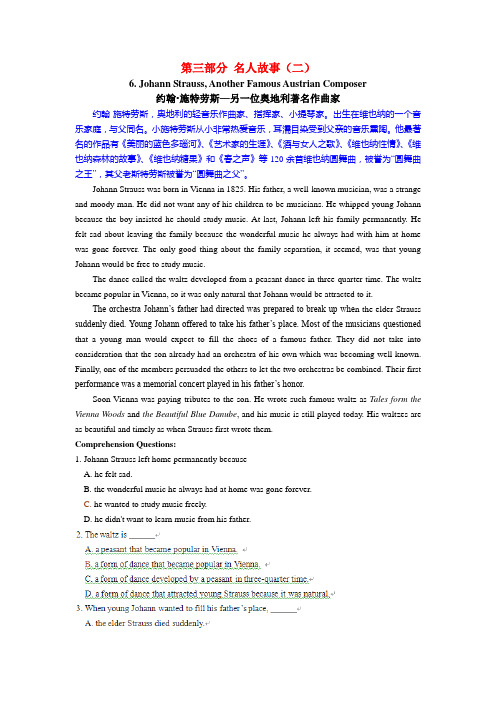
第三部分名人故事(二)6. Johann Strauss, Another Famous Austrian Composer约翰•施特劳斯—另一位奥地利著名作曲家约翰·施特劳斯,奥地利的轻音乐作曲家、指挥家、小提琴家。
出生在维也纳的一个音乐家庭,与父同名。
小施特劳斯从小非常热爱音乐,耳濡目染受到父亲的音乐熏陶。
他最著名的作品有《美丽的蓝色多瑙河》、《艺术家的生涯》、《酒与女人之歌》、《维也纳性情》、《维也纳森林的故事》、《维也纳糖果》和《春之声》等120余首维也纳圆舞曲,被誉为“圆舞曲之王”,其父老斯特劳斯被誉为“圆舞曲之父”。
Johann Strauss was born in Vienna in 1825. His father, a well-known musician, was a strange and moody man. He did not want any of his children to be musicians. He whipped young Johann because the boy insisted he should study music. At last, Johann left his family permanently. He felt sad about leaving the family because the wonderful music he always had with him at home was gone forever. The only good thing about the family separation, it seemed, was that young Johann would be free to study music.The dance called the waltz developed from a peasant dance in three-quarter time. The waltz became popular in Vienna, so it was only natural that Johann would be attracted to it.The orchestra Johann’s father had directed was prepared to break up whe n the elder Strauss suddenly died. Young Johann offered to take his father’s place. Most of the musicians questioned that a young man would expect to fill the shoes of a famous father. They did not take into consideration that the son already had an orchestra of his own which was becoming well known. Finally, one of the members persuaded the others to let the two orchestras be combined. Their first performance was a memorial concert played in his father’s honor.Soon Vienna was paying tributes to the son. He wrote such famous waltz as Tales form the Vienna Woods and the Beautiful Blue Danube, and his music is still played today. His waltzes are as beautiful and timely as when Strauss first wrote them.Comprehension Questions:1. Johann Strauss left home permanently because ______A. he felt sad.B. the wonderful music he always had at home was gone forever.C. he wanted to study music freely.D. he didn't want to learn music from his father.B. most musicians didn't believe that young Strauss' feet were as big as his father's.C. most of the musicians thought he was unable to do so.D. most of the musicians considered him able to do so.4. Johann directed the first performance of the newly combined orchestra ______A. because people didn't believe his ability.B. because one of the members persuaded the others to let him direct the orchestra.C. in memory of his father.D. because he could enjoy the honor of his father.5. Tales from the Vienna Woods is ______A. a collection of stories written by Johann Strauss.B. a piece of famous waltz by Johann Strauss.C. as good a story as The Beautiful Blue Danube.D. a piece of beautiful waltz written first by Johann Strauss.(CBCCB)7. Charles Chaplin, King of the Film World查理•卓别林—电影之王查理·卓别林,英国电影演员,导演和制片人。
英语阅读理解(人物故事)练习题及答案及解析
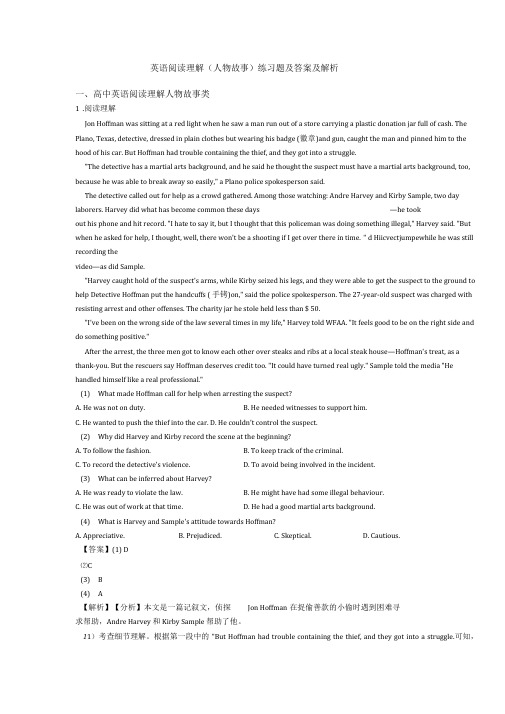
英语阅读理解(人物故事)练习题及答案及解析一、高中英语阅读理解人物故事类1.阅读理解Jon Hoffman was sitting at a red light when he saw a man run out of a store carrying a plastic donation jar full of cash. The Plano, Texas, detective, dressed in plain clothes but wearing his badge (徽章)and gun, caught the man and pinned him to the hood of his car. But Hoffman had trouble containing the thief, and they got into a struggle."The detective has a martial arts background, and he said he thought the suspect must have a martial arts background, too, because he was able to break away so easily," a Plano police spokesperson said.The detective called out for help as a crowd gathered. Among those watching: Andre Harvey and Kirby Sample, two day laborers. Harvey did what has become common these days —he tookout his phone and hit record. "I hate to say it, but I thought that this policeman was doing something illegal," Harvey said. "But when he asked for help, I thought, well, there won't be a shooting if I get over there in time. " d Hiicvectjumpewhile he was still recording thevideo—as did Sample."Harvey caught hold of the suspect's arms, while Kirby seized his legs, and they were able to get the suspect to the ground to help Detective Hoffman put the handcuffs ( 手铐)on," said the police spokesperson. The 27-year-old suspect was charged with resisting arrest and other offenses. The charity jar he stole held less than $ 50."I've been on the wrong side of the law several times in my life," Harvey told WFAA. "It feels good to be on the right side and do something positive."After the arrest, the three men got to know each other over steaks and ribs at a local steak house—Hoffman's treat, as a thank-you. But the rescuers say Hoffman deserves credit too. "It could have turned real ugly." Sample told the media "He handled himself like a real professional."(1)What made Hoffman call for help when arresting the suspect?A. He was not on duty.B. He needed witnesses to support him.C. He wanted to push the thief into the car.D. He couldn't control the suspect.(2)Why did Harvey and Kirby record the scene at the beginning?A. To follow the fashion.B. To keep track of the criminal.C. To record the detective's violence.D. To avoid being involved in the incident.(3)What can be inferred about Harvey?A. He was ready to violate the law.B. He might have had some illegal behaviour.C. He was out of work at that time.D. He had a good martial arts background.(4)What is Harvey and Sample's attitude towards Hoffman?A. Appreciative.B. Prejudiced.C. Skeptical.D. Cautious.【答案】(1) D⑵C(3) B(4) A【解析】【分析】本文是一篇记叙文,侦探Jon Hoffman在捉偷善款的小偷时遇到困难寻求帮助,Andre Harvey 和Kirby Sample 帮助了他。
高中英语阅读理解(人物故事)试题(有答案和解析)
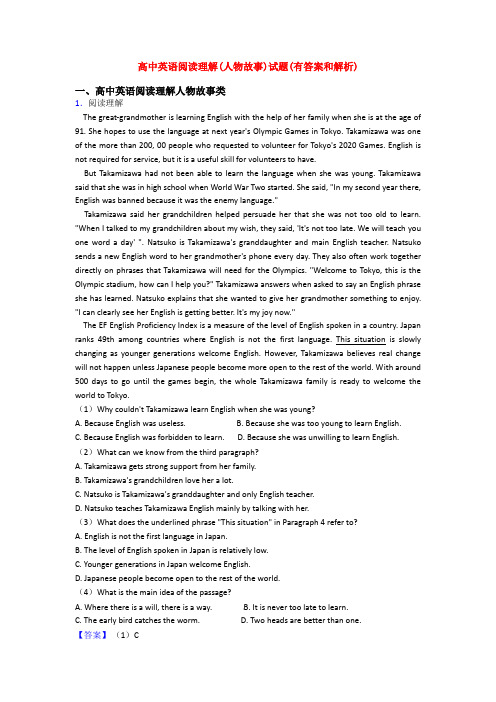
高中英语阅读理解(人物故事)试题(有答案和解析)一、高中英语阅读理解人物故事类1.阅读理解The great-grandmother is learning English with the help of her family when she is at the age of 91. She hopes to use the language at next year's Olympic Games in Tokyo. Takamizawa was one of the more than 200, 00 people who requested to volunteer for Tokyo's 2020 Games. English is not required for service, but it is a useful skill for volunteers to have.But Takamizawa had not been able to learn the language when she was young. Takamizawa said that she was in high school when World War Two started. She said, "In my second year there, English was banned because it was the enemy language."Takamizawa said her grandchildren helped persuade her that she was not too old to learn. "When I talked to my grandchildren about my wish, they said, 'It's not too late. We will teach you one word a day' ". Natsuko is Takamizawa's granddaughter and main English teacher. Natsuko sends a new English word to her grandmother's phone every day. They also often work together directly on phrases that Takamizawa will need for the Olympics. "Welcome to Tokyo, this is the Olympic stadium, how can I help you?" Takamizawa answers when asked to say an English phrase she has learned. Natsuko explains that she wanted to give her grandmother something to enjoy. "I can clearly see her English is getting better. It's my joy now."The EF English Proficiency Index is a measure of the level of English spoken in a country. Japan ranks 49th among countries where English is not the first language. This situation is slowly changing as younger generations welcome English. However, Takamizawa believes real change will not happen unless Japanese people become more open to the rest of the world. With around 500 days to go until the games begin, the whole Takamizawa family is ready to welcome the world to Tokyo.(1)Why couldn't Takamizawa learn English when she was young?A. Because English was useless.B. Because she was too young to learn English.C. Because English was forbidden to learn.D. Because she was unwilling to learn English.(2)What can we know from the third paragraph?A. Takamizawa gets strong support from her family.B. Takamizawa's grandchildren love her a lot.C. Natsuko is Takamizawa's granddaughter and only English teacher.D. Natsuko teaches Takamizawa English mainly by talking with her.(3)What does the underlined phrase "This situation" in Paragraph 4 refer to?A. English is not the first language in Japan.B. The level of English spoken in Japan is relatively low.C. Younger generations in Japan welcome English.D. Japanese people become open to the rest of the world.(4)What is the main idea of the passage?A. Where there is a will, there is a way.B. It is never too late to learn.C. The early bird catches the worm.D. Two heads are better than one.【答案】(1)C(2)A(3)B(4)B【解析】【分析】本文是一篇记叙文,日本91岁的奶奶Takamizawa为了做好迎接在东京举行的2020奥运会的志愿工作,在孙辈的鼓励和帮助下开始学习英语。
高中英语阅读理解(人物故事)练习题及解析
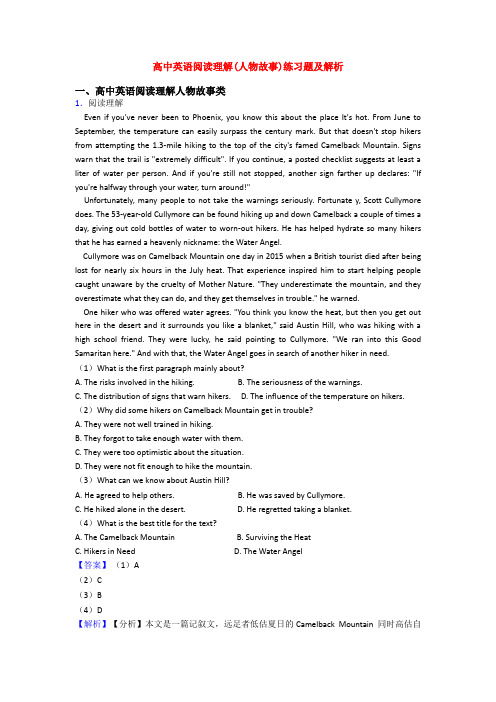
高中英语阅读理解(人物故事)练习题及解析一、高中英语阅读理解人物故事类1.阅读理解Even if you've never been to Phoenix, you know this about the place It's hot. From June to September, the temperature can easily surpass the century mark. But that doesn't stop hikers from attempting the 1.3-mile hiking to the top of the city's famed Camelback Mountain. Signs warn that the trail is "extremely difficult". If you continue, a posted checklist suggests at least a liter of water per person. And if you're still not stopped, another sign farther up declares: "If you're halfway through your water, turn around!"Unfortunately, many people to not take the warnings seriously. Fortunate y, Scott Cullymore does. The 53-year-old Cullymore can be found hiking up and down Camelback a couple of times a day, giving out cold bottles of water to worn-out hikers. He has helped hydrate so many hikers that he has earned a heavenly nickname: the Water Angel.Cullymore was on Camelback Mountain one day in 2015 when a British tourist died after being lost for nearly six hours in the July heat. That experience inspired him to start helping people caught unaware by the cruelty of Mother Nature. "They underestimate the mountain, and they overestimate what they can do, and they get themselves in trouble." he warned.One hiker who was offered water agrees. "You think you know the heat, but then you get out here in the desert and it surrounds you like a blanket," said Austin Hill, who was hiking with a high school friend. They were lucky, he said pointing to Cullymore. "We ran into this Good Samaritan here." And with that, the Water Angel goes in search of another hiker in need.(1)What is the first paragraph mainly about?A. The risks involved in the hiking.B. The seriousness of the warnings.C. The distribution of signs that warn hikers.D. The influence of the temperature on hikers.(2)Why did some hikers on Camelback Mountain get in trouble?A. They were not well trained in hiking.B. They forgot to take enough water with them.C. They were too optimistic about the situation.D. They were not fit enough to hike the mountain.(3)What can we know about Austin Hill?A. He agreed to help others.B. He was saved by Cullymore.C. He hiked alone in the desert.D. He regretted taking a blanket.(4)What is the best title for the text?A. The Camelback MountainB. Surviving the HeatC. Hikers in NeedD. The Water Angel【答案】(1)A(2)C(3)B(4)D【解析】【分析】本文是一篇记叙文,远足者低估夏日的Camelback Mountain 同时高估自己的能力,所以在远足途中遇到麻烦,Cullymore了解情况后决定帮助他们。
2015年全国高考英语真题汇编:阅读之人物传记类

2015全国高考汇编阅读之人物传记类(2015全国1)Salvador Dali (1904-1989) was one of the most popular of modern artists. The Pompidou Centre in Paris is showing its respect and admiration for the artist and his powerful personality with an exhibition bringing together over 200 paintings, sculptures, drawings and more. Among the works and masterworks on exhibition the visitor will find the best pieces, most importantly The Persistence of Memory. There is also L’Enigme sans Fin from 1938, works on paper, objects, and projects for stage and screen and selected parts from television programmes reflecting the artist’s showman qualities.The visitor will enter the World of Dali through an egg and is met with the beginning, the world of birth. The exhibition follows a path of time and subject with the visitor exiting through the brain.The exhibition shows how Dali draws the viewer between two infinities (无限). “From the infinity small to the infinity large, contraction and expansion coming in and out of focus: amazing Flemish accuracy and the showy Baroque of old painting that he used in his museum-theatre in Figueras,” explains the Pompidou Centre.The fine selection of the major works was done in close collaboration (合作)with the Museo Nacional Reina Sofia in Madrid, Spain, and with contributions from other institutions like the Salvador Dali Museum in St. Petersburg.28. Which of the following best describe Dali according to Paragraph 1?A. Optimistic.B. ProductiveC. Generous.D. Traditional.29. What is Dali’s The Persistence of Memory considered to be?A. One of his masterworks.B. A successful screen adaptation.C. An artistic creation for the stage.D. One of the beat TV programmes.30. How are the exhibits arranged at the World of Dali?A. By popularity.B. By importance.C. By size and shape.D. By time and subject.31. What does the word “contributions” in the last paragraph refer to?A. Artworks.B. Projects.C. Donations.D. Documents.(2015安徽)When her five daughters were young, Helene An always told them that there was strength in unity (团结). To show this, she held up one chopstick, representing one person. Then she easily broke it into two pieces. Next, she tied several chopsticks together, representing a family. She showed the girls it was hard to break the tied chopsticks. This lesson about family unity stayed with the daughters as they grew up.Helene An and her family own a large restaurant business in California. However, when Helene and her husband Danny left their home in Vietnam in 1975, they didn't have much money. They moved their family to San Francisco. There they joined Danny's mother, Diana, who owned a small Italian sandwich shop. Soon afterwards, Helene and Diana changed the sandwich shop into a small Vietnamese restaurant. The five daughters helped in the restaurant when they were young. However, Helene did not want her daughters to always work in the family business because she thought it was too hard.Eventually the girls all graduated from college and went away to work for themselves, but one by one, the daughters returned to work in the family business. They opened new restaurants in San Francisco and Los Angeles. Even though family members sometimes disagreed with each other, they worked together to make the business successful. Daughter Elisabeth explains, "Our mother taught us that to succeed we must have unity, and to have unity we must have peace. Without the strength of the family, there is no business."Their expanding business became a large corporation in 1996, with three generations of Ans working together. Now the Ans' corporation makes more than $20 million each year. Although they began with a small restaurant, they had big dreams, and they worked together. Now they are a big success.60. Helene tied several chopsticks together to show ______.A. the strength of family unityB. the difficulty of growing upC. the advantage of chopsticksD. the best way of giving a lesson61. We can I earn from Paragraph 2 that the An family ______.A. started a business in 1975B. left Vietnam without much moneyC. bought a restaurant in San FranciscoD. opened a sandwich shop in Los Angeles62. What can we infer about the An daughters?A. They did not finish their college education.B. They could not bear to work in the family business.C. They were influenced by what Helene taught them.D. They were troubled by disagreement among family members.63. Which of the following can be the best title for the passage?A. How to Run a CorporationB. Strength Comes from PeaceC. How to Achieve a Big DreamD. Family Unity Builds Success。
2015年高中英语阅读理解第三部分名人故事(二)练习
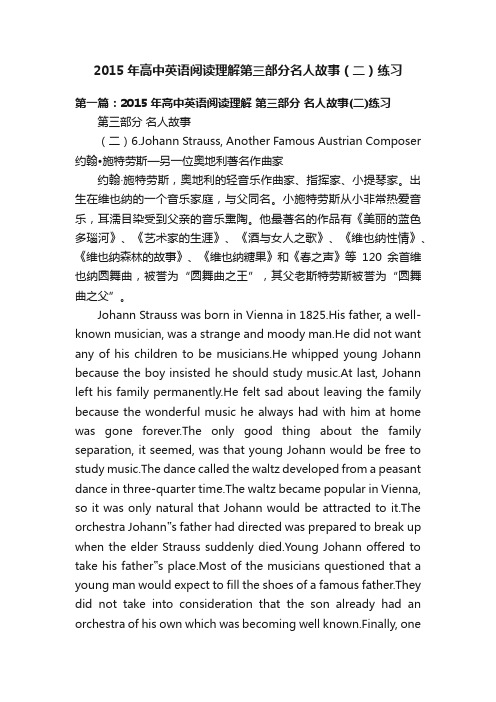
2015年高中英语阅读理解第三部分名人故事(二)练习第一篇:2015年高中英语阅读理解第三部分名人故事(二)练习第三部分名人故事(二)6.Johann Strauss, Another Famous Austrian Composer 约翰•施特劳斯—另一位奥地利著名作曲家约翰·施特劳斯,奥地利的轻音乐作曲家、指挥家、小提琴家。
出生在维也纳的一个音乐家庭,与父同名。
小施特劳斯从小非常热爱音乐,耳濡目染受到父亲的音乐熏陶。
他最著名的作品有《美丽的蓝色多瑙河》、《艺术家的生涯》、《酒与女人之歌》、《维也纳性情》、《维也纳森林的故事》、《维也纳糖果》和《春之声》等120余首维也纳圆舞曲,被誉为“圆舞曲之王”,其父老斯特劳斯被誉为“圆舞曲之父”。
Johann Strauss was born in Vienna in 1825.His father, a well-known musician, was a strange and moody man.He did not want any of his children to be musicians.He whipped young Johann because the boy insisted he should study music.At last, Johann left his family permanently.He felt sad about leaving the family because the wonderful music he always had with him at home was gone forever.The only good thing about the family separation, it seemed, was that young Johann would be free to study music.The dance called the waltz developed from a peasant dance in three-quarter time.The waltz became popular in Vienna, so it was only natural that Johann would be attracted to it.The orchestra Johann‟s father had directed was prepared to break up when the elder Strauss suddenly died.Young Johann offered to take his father‟s place.Most of the musicians questioned that a young man would expect to fill the shoes of a famous father.They did not take into consideration that the son already had an orchestra of his own which was becoming well known.Finally, oneof the members persuaded the others to let the two orchestras be combined.Their first performance was a memorial concert played in his father‟s honor.Soon Vienna was paying tributes to the son.He wrote such famous waltz as Tales form the Vienna Woods and the Beautiful Blue Danube, and his music is still played today.His waltzes are as beautiful and timely as when Strauss first wrote prehension Questions:1.Johann Strauss left home permanently because ______ A.he felt sad.B.the wonderful music he always had at home was gone forever.C.he wanted to study music freely.D.he didn't want to learn music from his father.B.most musicians didn't believe that young Strauss' feet were as big as his father's.C.most of the musicians thought he was unable to do so.D.most of the musicians considered him able to do so.4.Johann directed the first performance of the newly combined orchestra ______ A.because people didn't believe his ability.B.because one of the members persuaded the others to let him direct the orchestra.C.in memory of his father.D.because he could enjoy the honor of his father.5.Tales from the Vienna Woods is ______ A.a collection of stories written by Johann Strauss.B.a piece of famous waltz by Johann Strauss.C.as good a story as The Beautiful Blue Danube.D.a piece of beautiful waltz written first by Johann Strauss.(CBCCB)7.Charles Chaplin, King of the Film World 查理•卓别林—电影之王查理·卓别林,英国电影演员,导演和制片人。
高三英语阅读理解(人物故事)的技巧及练习题及练习题(含答案)含解析

高三英语阅读理解(人物故事)的技巧及练习题及练习题(含答案)含解析一、高中英语阅读理解人物故事类1.阅读理解Imagine someone who has spent the majority of their life sitting with a sign on the side of the road and that very person giving someone their last 20 dollars. That's exactly what Marine Corps veteran (退伍军人) Johnny Bobbitt, 34, did in October in Philadelphia.Bobbitt served in the U.S. Marine Corps and worked as a paramedic (医务辅助人员) in Vance County, N. C. before he became homeless. Nobody knew how he got to where he was because he was discreet about that.One night in October, Bobbitt was sitting roadside with a sign in Philadelphia as usual, when Kate McClure of Florence Township, N. J. was driving home down Interstate 95 and ran out of gas. Scared and nervous, she got out of the car to head to the nearest gas station. As McClure was heading to the nearest gas station, she ran into Bobbitt and he told her to get back in the vehicle and lock the door. Minutes later, he appeared with a red gas can. He'd used his last $20 to buy her gas.After that unexpected meeting, McClure and her boyfriend, Mark D'Amico, who both live in New Jersey, visited Bobbitt several times to deliver gift cards, cash, snacks and toiletries. They then decided to create a fund raising page so he wouldn't have to spend the holidays sleeping on the street.McClure started the GoFundMe page on November 10. With the page, the couple hoped to raise $10,000, enough money for his rent, a reliable vehicle and up to six months' expenses. Bobbitt's story ran in a local paper. By November 15,more than 10,000 local people had made donations through the GoFundMe page and more than $300,000 had been raised.On Thanksgiving, Bobbitt was resting in a hotel, his feet up on the bed, drawing up a grand plan for his new life, thanks to several thousand dollars raised to repay him for a good deed.(1)What does the underlined word "discreet" in paragraph 2 most probably mean?A. Doubtful.B. Cautious.C. Guilty.D. Optimistic.(2)McClure met Bobbitt when she .A. couldn't find a gas stationB. got to the way homeC. couldn't unlock her carD. was in search of gas(3)It can be known from the text that .A. Bobbitt's story obtained wide attentionB. Bobbitt became world-famous overnightC. the GoFundMe page collected over $400,000 for BobbittD. the GoFundMe page was started to help people like Bobbitt(4)What is the best title for the text?A. A Homeless Veteran Paid Kindness ForwardB. A Homeless Veteran Had a Generous HeartC. A Homeless Veteran's Kindness Paid OffD. A Small Kindness Made a Big Difference【答案】(1)B(2)D(3)A(4)C【解析】【分析】本文是一篇记叙文,—个无家可归的退伍军人将身上仅有的二十美元买了汽油送给在回家途中汽车没油的年轻女子,事后这名女子和她的男朋友专门建了一个网页为他募捐,使他不用再睡在大街上。
(英语)高中英语阅读理解(人物故事)解题技巧及练习题(含答案)及解析
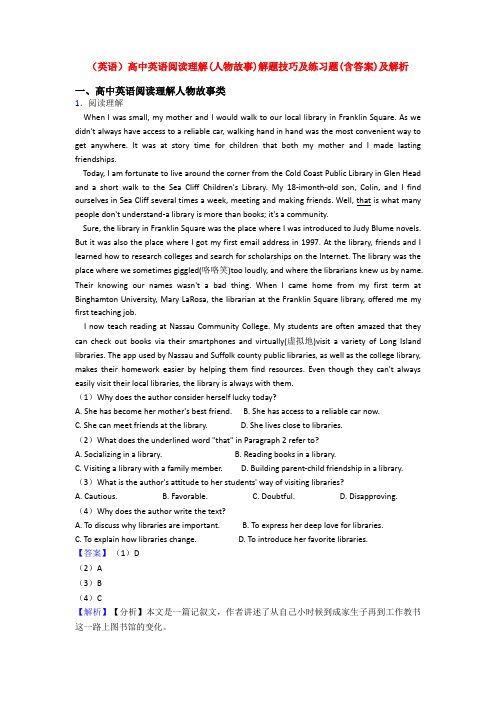
(英语)高中英语阅读理解(人物故事)解题技巧及练习题(含答案)及解析一、高中英语阅读理解人物故事类1.阅读理解When I was small, my mother and I would walk to our local library in Franklin Square. As we didn't always have access to a reliable car, walking hand in hand was the most convenient way to get anywhere. It was at story time for children that both my mother and I made lasting friendships.Today, I am fortunate to live around the corner from the Cold Coast Public Library in Glen Head and a short walk to the Sea Cliff Children's Library. My 18-imonth-old son, Colin, and I find ourselves in Sea Cliff several times a week, meeting and making friends. Well, that is what many people don't understand-a library is more than books; it's a community.Sure, the library in Franklin Square was the place where I was introduced to Judy Blume novels. But it was also the place where I got my first email address in 1997. At the library, friends and I learned how to research colleges and search for scholarships on the Internet. The library was the place where we sometimes giggled(咯咯笑)too loudly, and where the librarians knew us by name. Their knowing our names wasn't a bad thing. When I came home from my first term at Binghamton University, Mary LaRosa, the librarian at the Franklin Square library, offered me my first teaching job.I now teach reading at Nassau Community College. My students are often amazed that they can check out books via their smartphones and virtually(虚拟地)visit a variety of Long Island libraries. The app used by Nassau and Suffolk county public libraries, as well as the college library, makes their homework easier by helping them find resources. Even though they can't always easily visit their local libraries, the library is always with them.(1)Why does the author consider herself lucky today?A. She has become her mother's best friend.B. She has access to a reliable car now.C. She can meet friends at the library.D. She lives close to libraries.(2)What does the underlined word "that" in Paragraph 2 refer to?A. Socializing in a library.B. Reading books in a library.C. Visiting a library with a family member.D. Building parent-child friendship in a library.(3)What is the author's attitude to her students' way of visiting libraries?A. Cautious.B. Favorable.C. Doubtful.D. Disapproving.(4)Why does the author write the text?A. To discuss why libraries are important.B. To express her deep love for libraries.C. To explain how libraries change.D. To introduce her favorite libraries.【答案】(1)D(2)A(3)B(4)C【解析】【分析】本文是一篇记叙文,作者讲述了从自己小时候到成家生子再到工作教书这一路上图书馆的变化。
- 1、下载文档前请自行甄别文档内容的完整性,平台不提供额外的编辑、内容补充、找答案等附加服务。
- 2、"仅部分预览"的文档,不可在线预览部分如存在完整性等问题,可反馈申请退款(可完整预览的文档不适用该条件!)。
- 3、如文档侵犯您的权益,请联系客服反馈,我们会尽快为您处理(人工客服工作时间:9:00-18:30)。
第三部分名人故事(三)11. Mark Twain, Welcome American Humorist马克•吐温—受欢迎的美国幽默作家马克·吐温,真名塞姆·朗赫恩·克列门斯(Samuel Langhorne Clemens),是美国的幽默大师、小说家、作家,亦是著名演说家。
短篇小说《百万英磅》、《竞选州长》和长篇《哈克贝里·芬历险记》、《汤姆·索亚历险记》最为人们所称道。
海伦·凯勒曾言:“我喜欢马克吐温——谁会不喜欢他呢?即使是上帝,亦会钟爱他,赋予其智慧,并于其心灵里绘画出一道爱与信仰的彩虹。
”威廉·福克纳称马克·吐温为“第一位真正的美国作家,我们都是继承他而来”。
One of the best known American writers is Samuel Langhorne Clemens, whose pen name is Mark Twain. Born in 1855, Twain grew up in the Mississippi River town of Hannibal, Missouri. As did many other boys of his day, Twain dreamed of traveling on riverboats and of someday becoming a riverboat pilot. Twain used his memories of the life of a river town in his two most famous books, the Adventures of Huckleberry Finn and the Adventures of Tom Sawyer.As a young man Twain held many jobs. He was a printer, a gold miner, and for a time, he was a riverboat pilot. During his pilot days, he adopted the name Mark Twain. This was a term used by the boatmen to mean that the water measured two fathoms, or twelve feet, which was deep enough for safe passage.Finally Twain became a successful writer. He traveled a great deal, writing and speaking, and became very popular both in the United States and in Europe.Twain's style of writing was simple and direct. Among the things he wrote about were superstitious people and people who were easily fooled. He used his unusual gift for humor to write about many things of importance.Comprehension Questions:1. Samuel Langhorne Clemens ______A. was as famous as Mark Twain.B. is better known than Mark Twain.C. grew up in the Mississippi River town of Hannibal with Mark Twain as his friend.D. was used by Mark Twain as his pen name.A. a term to indicate Mark Twain.B. a depth at which boats can safely pass.C. was used by boatmen to measure the depth of water.D. considered to be deep enough for pilots to swim across the river.5. Twain’s style of writing is ______A. humorousB. simpleC. directD. all of the above. (DDBBD)12. Charles Dickens, One of the Greatest English Writers查尔斯•狄更斯—英国最伟大的作家之一查尔斯·狄更斯,是英国文学史上唯一可与莎士比亚媲美的伟大作家。
1812年2月7日生于朴次茅斯市郊,1870年6月9日卒于罗切斯特附近的盖茨山庄。
一生共创作长篇小说13部半,其中多数是近百万言的大部头作品,中篇小说20余部,短篇小说数百篇,以及大量演说词、书信、散文、杂诗。
其中,《圣诞颂歌》、《大卫·科波菲尔》、《双城记》最为人们所称道。
他多次去欧洲大陆游历、旅居,两次访问美国。
When Charles Dickens was a small boy, he was sent by his parents to work in a boot-blacking factory. His parents had other children and many debts to pay.Charles's father was put into prison for his debts. The boy tried to raise money enough to get him out but was unsuccessful. At last, the whole family went to live with Charles's father in his room in the Marsalsea prison. This was a common practice and, while the prisoner could not leave the grounds, the families could go in and out freely until the gate was locked at night.For the rest of his days, Dickens was interested in prisons. Whenever he traveled through strange towns and cities, he went to visit them, as other tourists would visit museums and palaces. Almost every book he wrote has a prison and some prisoners in it.He had been born in 1812 and had stayed busy at one kind of work or another from the time he was six years of age. He died of a sudden stroke in 1870. He provided the world with its clearest picture of the texture of English life during the 1800's, one without which readers would never know the sounds, smells, and tastes of those long-ago days.A. the boy couldn't raise enough money.B. he couldn't return the money he had borrowed from others.C. the boy was unsuccessful in making enough money in the boot-blacking factory.D. the boy was too small to save him.3. The common practice of those days was ______A. the family should go to live together with the prisoner.B. the family members should remain in prison until the prisoner was set free.C. the family members could stay with the prisoner and have freedom to leave or enter the prison in the daytime.D. the family members could go in and out of the prison at any time.4. The difference between Charles Dickens and other tourists lies in that ______A. he liked to visit prisons while others didn't.B. he liked to visit palaces while others didn't.C. he was not interested in prisons while others were.D. others showed more interest in prisons than him.5. If you read Charles Dickens’s novels, you can ______A. see a clearest picture.B. hear the sounds, enjoy the smells and tastes of those long-ago days.C. know very clearly what the life of the nineteenth century England was like.D. know clearly how he and his family lived in the prison.(BBCAC)13. Goethe, Germany’s Greatest Poet歌德—德国最伟大的诗人约翰·沃尔夫冈·歌德(1749-1832),是18世纪中叶到19世纪初德国和欧洲最重要的作家、诗人。
